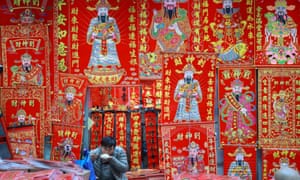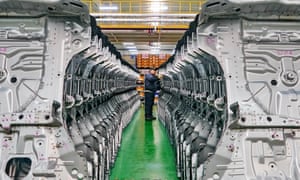
If China is indeed entering an economic winter, then the chill will spread around the globe. Forty years after communist China opened its doors to trade with the west in a dash for growth, the country’s mix of free-market policies and central planning faces one of its sternest tests.
China’s central bank said on Friday it was cutting the amount of cash that banks have to hold as reserves for the fifth time in a year, freeing up $116bn (£92bn) for new lending, as it tried to reduce the risk of a sharp economic slowdown.
This week US negotiators will travel to Beijing for a crucial round of talks with their Chinese counterparts in an attempt to break the deadlock in a year-long dispute over trade tariffs. Global markets, worried about the impact of tariffs on growth, have suffered a jump in volatility over recent months, with investors oscillating between exuberant optimism and despondency about the outcome.
Despite a near 20% fall in the US stock market between October and last month, some investors believe there are reasons for hope. They think Beijing might blink first in talks because the Chinese have much to lose by maintaining their objections to President Trump’s demands over trade imbalances, market access and alleged abuses of intellectual property.
Beijing has downplayed the impact of extra tariffs on around £200bn of Chinese imports into the US. But the evidence from businesses and commentators inside China is clear: the dispute is hurting. And Trump’s threat to impose tariffs on almost $300bn of extra imports in March, including a 25% charge on imported cars, would be catastrophic.
“China’s economy was already set to slow in 2019, but the trade dispute has added to it another set of intense pressures,” said Shehzad Qazi, managing director of China Beige Book International, an analysis firm that specialises in the Chinese economy.
China’s exporting regions in the south have felt the impact most. “While it would be a mistake to attribute this primarily to the trade war, the severe deterioration in foreign orders, especially in the export-sensitive Guangdong region, stands out as a stark example of the pain the tariff war is already causing. If tariffs escalate further after 1 March, the added pressure on the Chinese economy will prove excruciating,” Qazi said.
In December, local media in the manufacturing hub of Shenzhen reported that Mindrey Medical, a medical equipment company, had dismissed more than 200 employees, all recent graduates. The company responded saying that it had “needed staff with more experience”.
Companies in Guangdong have been letting workers off early for the Chinese New Year break, known as Spring Festival, which usually last a few weeks. Janus, an electronics manufacturer in Dongguan, in Guangdong province, let workers off from 1 December until 30 April.
Wang Changqiu, the manager of Tuke, a sports equipment factory in Guangzhou in Guangdong, said the firm had started to feel the impact of the trade war. Tuke exports almost all its products and just under half go to the US. The firm has already been hit by the weakening yuan, which has cut into slim profit margins. The company had been trying to reduce its reliance on the US market, said Changqiu. “The trade war is bad for us and it impacts not only us, but our customers. We’re very worried,” he said.
The slowdown is also being felt in China’s hinterland. In Chengdu, the largest city in the south-western province of Sichuan, blocks of shops in the new business district of Chengdu High Tech Zone have been empty for months. A property manager said the company that owns them had been trying to sell them quickly because it needed the money.
In Wuhouci, a Tibetan neighbourhood popular with tourists, streets were mostly empty over the new year, a two-day national holiday in China. A shop owner selling Buddhist art and iconography said business had been hard over the past year. “No one has money to buy anything,” he said.
The impact of the US tariffs is expected to be felt more keenly starting from this month, now that major shopping seasons – Black Friday, Christmas, and China’s Singles’ Day on 11 November – have passed, analysts say.
China’s small and medium-sized manufacturing companies, traditionally the backbone of the economy, are bearing the brunt, according to Ye Tan, an independent economist based in Shanghai. “Economic figures have already started to reflect the downturn but we cannot tell exactly how awful it is,” Ye said. “For some technology companies or larger companies that have bargaining power, the impact is not so big.”
Underscoring Beijing’s weak position, President Xi Jinping backtracked on a ban on US soybeans in the summer and last month cut an extra tariff on car imports. These concessions preceded Trump’s agreement to suspend for 90 days the almost $300bn of further tariffs he had planned to impose this month – and start talks.
But Xi has more than just his battle with the US to contend with. Since the 2008 financial crisis, China’s large state-owned enterprises, most of which are involved in heavy manufacturing or energy production, have only kept going with heavy borrowing.
In an attempt to rein in the most indebted firms and foster a move away from manufacturing, in 2017 Beijing imposed tighter borrowing restrictions. These were also designed to dampen a property market that had led to steep price rises in the big cities. However, they served to undermine consumer confidence and slow growth, to the extent that some government advisers fear there could be social and political unrest.
Yu Yongding, a former member of the central bank’s monetary policy committee, who has advised policymakers for years, was quoted by the China Business News as saying: “China’s experiences in the last 40 years have told us that all the problems will worsen if we can’t maintain economic growth rate at a certain level.
“Without a certain level of economic growth speed, structural adjustments or economic system reform will be baseless,” said Yu, who is a senior research fellow at the Chinese Academy of Social Sciences.
Diana Choyleva, a longtime China watcher and head of consultancy Enodo Economics, believes modern China is in the midst of its most difficult test yet. “In my 20 years of covering China’s economy and markets, this is the most worried I’ve ever been about the party’s ability to keep the show on the road.”
Last week the central bank changed the definition of a small business to allow more firms to benefit from low borrowing rates. Economists estimate that this will result in the release of $210bn into the economy in the form of cheap loans.
Choyleva said the various stimulus policies will give the first half of the year a boost before growth falls back again. She has told her clients to sell shares in Chinese companies whenever the local market rises because the boost to values will be short-lived.
But while the reports of suffering of Chinese exporters might cheer the US negotiating team, they don’t hold all the cards. Apple and General Motors have complained that the tariff war is hurting their businesses too, as China is a vital market.
The White House is also waking up to the prospect of a slowing economy now that the effects of tax cuts in 2017 are waning. With re-election in 2020 uppermost in Trump’s mind, he must consider the electoral benefits of a long battle with China against the negative impact on economic growth. As Apple indicated last week, this could be a deep winter for everyone.
Wang Xueying contributed additional reporting.
Ref:https://www.theguardian.com/business/2019/jan/05/china-economy-slowdown-us-tariffs-trade-war

No comments:
Post a Comment